At Your Service
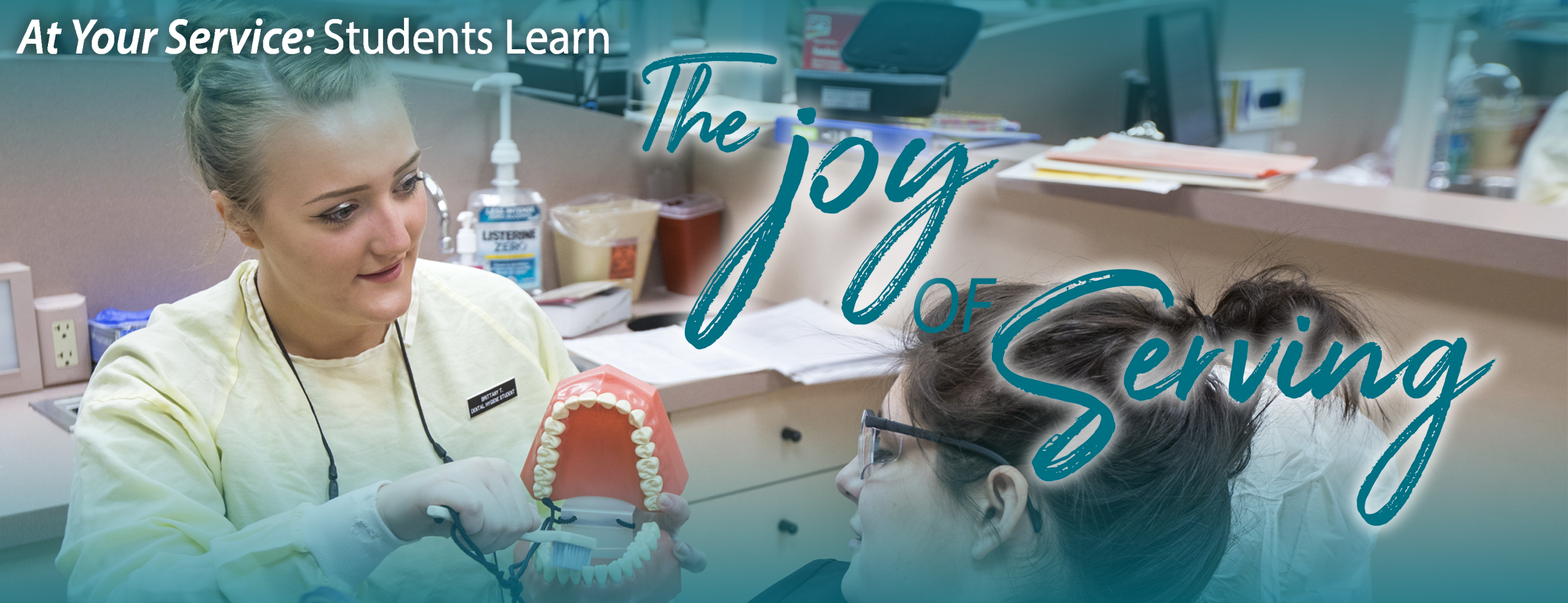
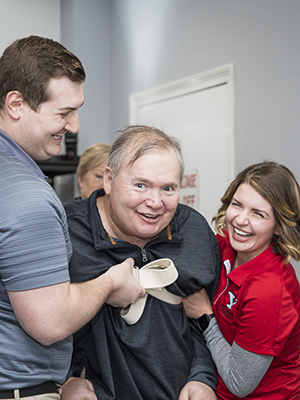
Six years ago, John Karlovic’s life changed in an instant. A former police officer working as a corporate security supervisor at the time, he broke his neck when he fell down a flight of stairs. He is paralyzed from the chest down.
A series of surgeries followed, with medical bills exceeding $1 million. Physical therapy became a necessity, but his health insurance allowed for a very limited number of treatments – until YSU stepped in to fill the gap.
Now, Karlovic makes weekly visits from his Hubbard, Ohio, home to the Midlothian Free Clinic near campus, where YSU Physical Therapy students provide him with the treatments he needs, free of charge – always under faculty supervision. He’s managed to maintain his remarkable sense of humor and keeps his student therapists laughing throughout the treatment process. “These students treat me with the utmost respect, and they know what they’re doing,” he said. “This is such a great service. Without it, people like me would have less and less.”
Service to the community has always been a central part of YSU’s mission, and the Midlothian Free Clinic is one of several venues that offer free care and service to Youngstown State University’s neighbors while giving students a wealth of invaluable, hands-on experience.
Often, the people they meet, the satisfaction they experience – and the intangible joy of serving others – has long-term effects on students’ career choices and how they spend their leisure time after college.
After School, the Learning Continues
When lines of yellow buses pull away from Campbell Elementary at the end of each school day, 40 or more students happily stay behind. They head first to the lunchroom for hearty snacks and homework time, then off to YSU-sponsored enrichment classes such as Spanish, arts and crafts, creative writing and team building.
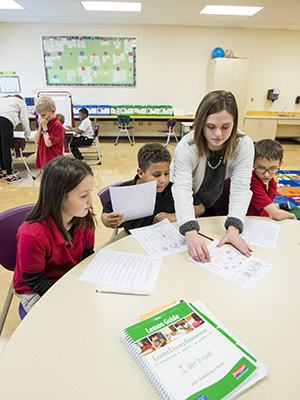
For Hailey Black, a junior Language Arts Education major from Steubenville, working as a student teacher in the Campbell program has been an eye-opener. On staff for three years, under the supervision of certified teachers, she’s conducted her own parent conferences, taken classes on field trips, gained experience in classroom management – and used her own money to help students who lack basic necessities.
She especially remembers a second grader who came to school without the required school uniform. “I knew her family didn’t have a lot. I went out and bought her a uniform, and I would drop extra snacks in her book bag,” she said.
The experience has reinforced her desire to be a teacher, and working in Campbell makes her believe that she would feel at home in an inner-city school district.
Afterschool and summer enrichment classes are the kinds of “extras” you would expect to find only in prosperous school districts, but YSU has secured grant funding from the Ohio Department of Education – $1.2 million for this fiscal year alone – to offer the programs in school districts, like Campbell, that have high percentages of economically disadvantaged students. Angela Cameron, director of YSU’s Center for Human Services Development, based in the Department of Counseling, School Psychology and Educational Leadership, said the university operates six enrichment programs in five districts across Mahoning, Trumbull and Columbiana counties. They are federally funded through Ohio’s 21st Century Community Learning Center grant program.
Many students enrolled in the afterschool and summer programs have little or no parental support at home, said Cameron, but student teachers are making a tangible difference. “Some of our parents can’t read, they can’t understand the new math, some don’t have internet access,” she said. “We are helping students to feel successful, and their parents are very grateful.”
Bringing Back Smiles
Junior Brittany Tice has experienced highs and lows as a student therapist working with patients in YSU’s Dental Hygiene Clinics on campus.
On the downside, the Dental Hygiene major from East Liverpool, Ohio, has witnessed the misery that can result when patients neglect their teeth.
“Some of our geriatric patients have abandoned their health for a long time,” she said. “We see a lot of bone loss and other issues. Sometimes it makes me want to cry.”
But Tice feels good when her care and instruction turn things around. One patient, for example, hadn’t brushed his teeth for years when he visited the clinic for the first time. “He brushes every night now,” she said with a proud grin.
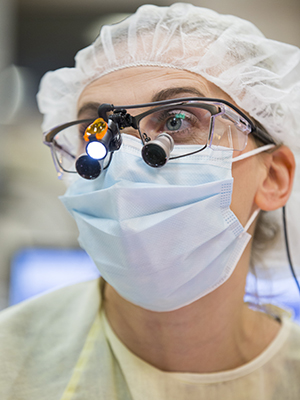
Juniors and seniors pursuing a bachelor’s degree in Dental Hygiene are required to gain clinical experience by caring for patients in YSU’s two, fully-equipped Dental Hygiene Clinics, located in Cushwa Hall. Working under the supervision of a licensed dentist and a licensed hygienist, they do oral examinations, scaling and polishing teeth, fluoride applications, local anesthesia and x-rays.
The services are always free and available, by appointment, to the campus community and to the general public. Suzanne Smith, program director and assistant professor, Health Professions, said the clinics operate Monday through Friday whenever classes are in session and average 2,500 patient appointments per academic year.
Patients are expected to see a private practice dentist for check-ups, fillings and more complex treatments, Smith said – clinic services are not intended to replace comprehensive dental care. Those who don’t have dental insurance or who have high deductibles often take advantage of the free care, she said, and the student hygienists also call on friends and family to help them meet their clinic requirements.
Clinic appointments can be time-consuming, she said. A routine dental examination and cleaning that might take an hour at a private dental office, for example, would take several hours at the clinic and generally would require more than one appointment. “We emphasize that appointments are lengthy because the students are learning,” Smith said. “Most of our patients understand, and they appreciate what we do.”
When Health Insurance Isn’t Enough
Delphi Packard retiree Eric Hsieh was determined to work his way back to full mobility when he suffered a stroke two years ago that left one side of his body paralyzed. Physical therapy seemed like the answer, but his health insurance had strict limits on the number of treatments he could receive.
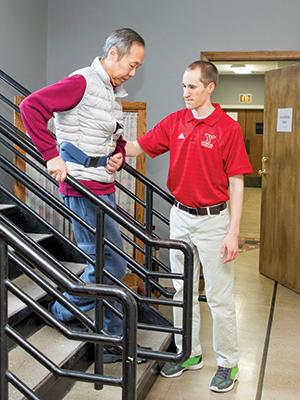
The Howland man is making great progress now, largely because he’s able to combine the paid therapy sessions his insurance covers with weekly, free physical therapy provided by YSU students at the Midlothian Free Health Clinic about two blocks from the YSU campus.
For Chris Scheitinger, a first-year student in the PT doctorate program, working with Hsieh was one of his first hands-on patient experiences. “I’m learning a lot,” he said, “and I feel like I’m helping somebody.”
Hsieh has that same feeling – he likes knowing that he’s giving his student therapist opportunities to gain professional knowledge and confidence.
Located inside First Presbyterian Church on Wick Avenue, the Midlothian Free Health Clinic provides a range of free health services for uninsured and underinsured clients and professional experience for students majoring in Social Work, Respiratory Therapy, Nursing, Dietary and Exercise Science. This semester alone, more than 130 students representing six disciplines gained hands-on experience in the clinic, under the guidance of fully-credentialed faculty supervisors.
The clinic, this year celebrating a decade of service, allows students to cultivate one-on-one relationships with patients that they can’t get in a classroom, said Jim Benedict, a PT professor and president of the clinic’s board of directors. “They learn about the challenges of working with a vulnerable population. Some are working poor. They can’t afford health insurance, and they may have to choose between food on the table or transportation to a therapy session. The students develop relationships with these people, and they understand the problems they face in the real world.”
The clinic never bills for its services, and there are expenses. First Presbyterian Church generously provides dedicated space for clinic services, free of charge as a community service; YSU faculty recently secured grant funds to pay for programming, equipment and research; and the clinic receives some university funding as part of the Centofanti Center for Health and Welfare for Vulnerable Populations.
Benedict emphasized that the clinic doesn’t take business away from paid medical providers. Patients that have health insurance are asked to use the services their coverage allows, using clinic services only when their monthly or yearly benefits are exhausted. “We don’t compete with paid clinics. We want to help them.”
Unscrambling the Tax Code
Albert Einstein once called income taxes “the hardest thing in the world to understand,” and most taxpayers would readily agree. On average, the IRS reports, households dole out $150 to $260 a year to have their taxes done by a professional.
But YSU’s Volunteer Income Tax Assistance program offers an alternative. Staffed by trained students and professional volunteers, YSU’s VITA program unscrambles the tax code for hundreds of taxpayers every year, free of charge.
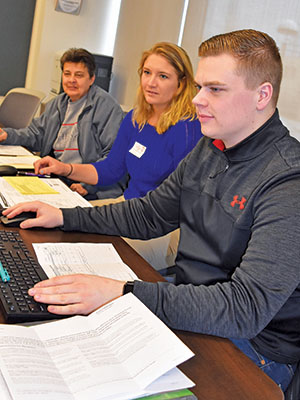
Ray Shaffer, professor emeritus, Accounting, and VITA director, said the program serves 500 or more clients annually – in 2017 the number topped 600 – including some “regulars” who have been coming back for a decade or more. “It just keeps getting busier and busier,” he said.
VITA tax preparers’ free services include electronic filing of federal, state and local taxes. Clients represent a wide range of taxpayer types: senior citizens and retirees, university students and employees, average-income and low-income families and foreign students. The program, housed in YSU’s Williamson College of Business Administration and sponsored by the Lariccia School of Accounting, runs most Saturdays, February through early April.
Student VITA volunteers, mostly junior and senior Accounting majors, begin intensive training for the program in January, said Shaffer, to earn the certifications required by the IRS. This year, 26 students completed the training course, which provides three hours of college credit.
Shaffer said the program offers the volunteers much more than tax code experience. The work provides real world experience and opportunities to develop interpersonal skills working with people. Students interview their clients one-on-one, prepare their tax returns while they wait, then present the results, whether it’s a refund, breaking even or money owed. “They hear some sad stories. People who are out of work, people who made financial mistakes. We see and hear everything, and the students learn so much. It’s real life,” he said.
